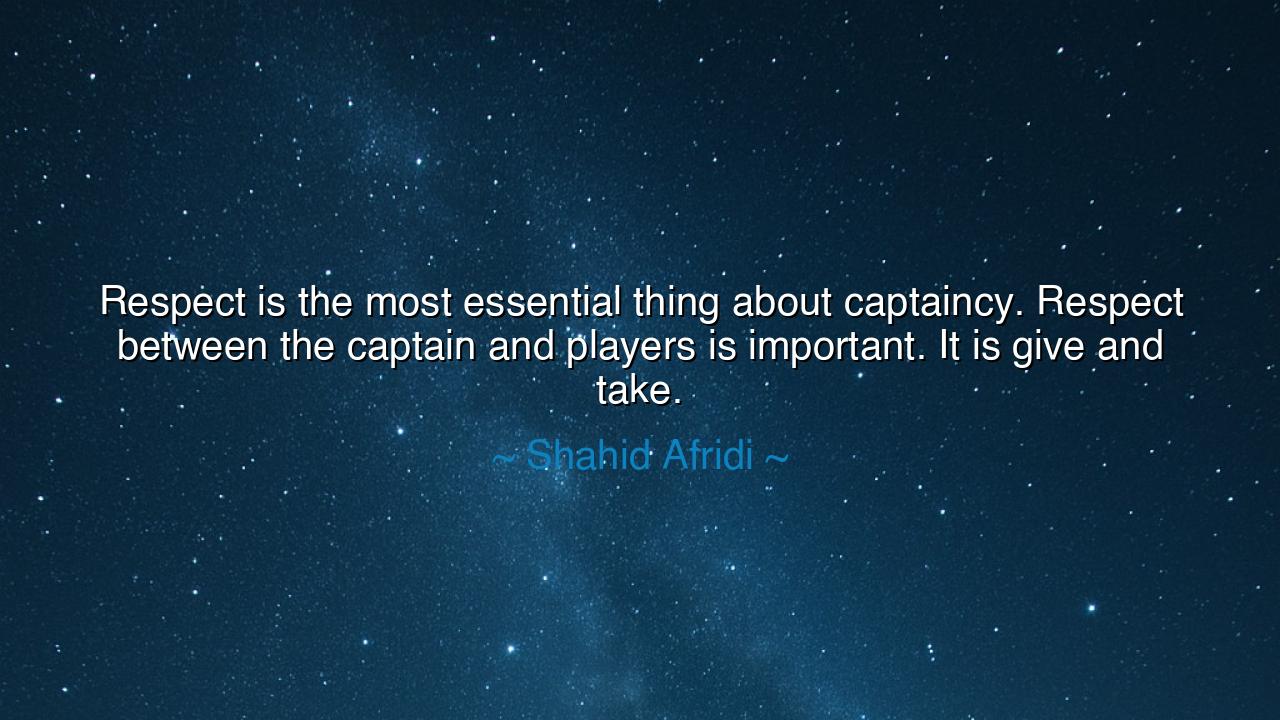
Respect is the most essential thing about captaincy. Respect
Respect is the most essential thing about captaincy. Respect between the captain and players is important. It is give and take.






"Respect is the most essential thing about captaincy. Respect between the captain and players is important. It is give and take." — Shahid Afridi
Hear these words, O seekers of leadership, for Shahid Afridi, the warrior of the cricketing fields, speaks not merely of games, but of the eternal laws that govern human harmony. In his words lies the essence of all command — that respect is the lifeblood of captaincy, the invisible bond that unites leader and follower. For though strength may win battles and skill may earn glory, it is mutual respect that sustains greatness. Without it, even the mightiest ship drifts rudderless upon the stormy sea.
Afridi’s insight springs from the crucible of sport — that grand stage where discipline, teamwork, and pride collide. He had led men under pressure, when entire nations watched with bated breath, when triumph and defeat danced as twin shadows before him. And through it all, he learned that a captain is not a ruler, but a servant of the team’s spirit. Authority alone cannot bind men together; only respect can. For respect is not demanded — it is earned, through courage, fairness, and humility.
The ancients too understood this truth. In the chronicles of history, we find tales of commanders who ruled not through fear, but through reverence. Alexander the Great, though a conqueror of nations, was beloved by his soldiers because he shared their hardships — he ate their food, walked their marches, bled their wounds. He knew that a leader’s power is hollow if not sanctified by the trust of his followers. His army would have followed him into the fire itself, not for his crown, but for his heart. That is the give and take Afridi speaks of — the sacred exchange between leader and led.
In contrast, where respect disintegrates, leadership perishes. A captain who commands without listening breeds resentment; a player who rebels without understanding breeds chaos. True leadership is not tyranny, nor is it servitude — it is balance, a living dialogue between equals striving toward a shared dream. The captain must inspire confidence, but he must also show vulnerability; he must guide firmly, yet be willing to be guided in return. Thus, respect flows both ways, like water between riverbanks — shaping and being shaped.
Consider the story of Imran Khan, another legend of the cricketing realm, who led Pakistan to its first World Cup victory in 1992. His men were not the most experienced nor the most consistent, yet he forged them into champions through mutual respect. He believed in each player’s worth, even when the world doubted them. In return, his players gave him their loyalty and fought beyond their limits. That victory was not merely of skill, but of unity born from honor between leader and team. It proved that respect transforms individuals into a brotherhood, and a group into a force of destiny.
Afridi’s teaching, then, transcends sport — it is a law of life. In every house, every workplace, every circle of comrades, leadership is tested not by authority but by reciprocity. To demand respect, one must first give it; to be followed, one must first serve. Let no leader forget that the greatness of the throne depends upon the faith of those who stand before it. And let no follower forget that obedience without respect is slavery, while respect freely given is strength.
So, O reader, take this lesson into your own life: whether you lead or follow, let respect be your compass. Listen before you command. Appreciate before you criticize. Stand firm, but never above. When you lift others with honor, you will find yourself lifted in return. For respect is the root of loyalty, the breath of teamwork, and the soul of leadership. Without it, all victories are fleeting; with it, even defeat carries glory.
And thus, let these words echo through the corridors of time — that leadership is not a crown worn upon the head, but a bond woven through respect. It is not dominance, but devotion. And in that eternal exchange — that give and take — lies the true greatness of any captain, any king, any human soul.






AAdministratorAdministrator
Welcome, honored guests. Please leave a comment, we will respond soon